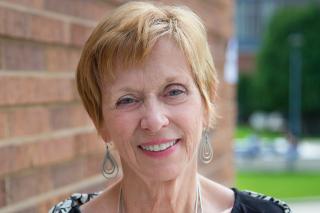Associate Professor and Associate Dean Anne-Marie Barron has served as a leader for the School of Nursing and Simmons University at a local, state, national, and international level. Since 2009, she has led the international project with Ayat Education in Bangladesh. This academic partnership with Massachusetts General Hospital has resulted in 17 trips to Bangladesh providing education and training on palliative care and the development of a bone marrow transplant center.
Learn more about how this partnership began and the importance of elevating nursing education in Bangladesh.
Addressing the nursing shortage in Bangladesh
I’ve been practicing an evening a week as a psychiatric clinical nurse specialist on the Inpatient Oncology and Bone Marrow Transplant Unit at Massachusetts General Hospital (MGH) since 2002. In early 2009, Dr. Bimalanghu Dey, a bone marrow transplant specialist with whom I work, approached me with an important question. Dr. Dey is Bangladeshi, and he shared his dream of giving back to his people some of the gifts of education, training, and practice that he has experienced in his career. His wish was to elevate healthcare for the people of Bangladesh.
He realized that without elevating nursing in Bangladesh, any possibility of making an impact on the health of Bangladeshi citizens would be greatly diminished. Dr. Dey spoke movingly about the knowledge, skill and compassion of the nurses we work with at MGH as essential and central for offering excellent care.
Unfortunately, in Bangladesh, nursing has been considered low status, even stigmatizing work. Unsurprisingly, with that perspective of the profession, there is a severe shortage of nurses in Bangladesh. He asked if I would accompany him and an MGH nurse practitioner colleague, Judy Foster, to explore nursing education and practice on a trip to Bangladesh. The trip was profound on many levels and became the first of many trips.
Simmons in Bangladesh

Since 2009 I have made seventeen trips to Bangladesh. 26 MGH nurses and nurse practitioners have traveled to Bangladesh, most taught to Bangladesh a number of times. Of the 26 nurses and NPs, eight of them graduated from Simmons, one is about to graduate from our Family Nurse Practitioner program, and one is currently a student in our FNP program. Simmons grads have and are making a remarkable difference in Bangladesh!
Professor Charlene Berube and I had planned a travel abroad course to Bangladesh for Simmons nursing students in May of 2017. Unfortunately, in the summer of 2016, there was an incident in Dhaka where Islamist extremists targeted foreign visitors in a café, killing twenty-two. Sadly, it became necessary for us to cancel the trip because of safety concerns.
We return from each trip recognizing that we receive far more than we offer.
Expanding nursing education
In January of 2019, I traveled to Dhaka with former Simmons Dean Judy Beal. Together with our wonderful local partners, Nusrat and Tahsin Aman, Dr. Dey, and a team of MGH nurses, we met with government officials and dignitaries. We discussed the importance of nursing education and practice, the success of our ongoing collaborative initiatives and described the importance of the training we were offering in collaboration with our local colleagues on serious illness and palliative care.
We have offered four five-day train-the-trainer intensives for 350 professionals, mostly nurses in Bangladesh. Dean Beal was warmly welcomed, and the government asked if we would offer the training in each of the eight major areas of Bangladesh.
Responding to COVID-19
The Simmons faculty community has contributed to many efforts in Bangladesh in addition to Professor Berube’s and Dean Beal’s support. In the spring of 2019, the Amans opened the Ayat College of Nursing and Health Sciences in Dhaka. We began offering faculty development sessions remotely with faculty in Dhaka during the fall of 2019.
Those sessions were interrupted in the spring of 2020 because of COVID-19. The Boston MGH-Simmons team then switched focus, and we have been offering remote COVID-19 related training across Bangladesh in collaboration with the Amans since the summer of 2020. Simmons faculty have been instrumental in those efforts and include:
- Dean Lepaine Sharp-McHenry
- Associate Dean Heather Shlosser
- Associate Dean Liz Scott
- Professor Kelly Marchant
- Professor Courtney Edison
- Professor Catherine Robbins
- Professor Colette Dieujuste
- Professor Josephine Faller
Nisha Wali ‘21FNP, who will graduate from our family nurse practitioner program in May, and Jocelyn Hulbert ‘08, a BSN graduate of Simmons, have been central to the COVID-related education efforts as well.
Transforming lives through the power of education

As an educator, the joy of witnessing, very directly, the power of education to transform lives is incredibly rewarding. The gratitude that nurses in Bangladesh express for our collaborations and teaching is inspiring and, honestly, somewhat overwhelming. There are very few opportunities for continuing professional education for nurses in Bangladesh. They are often filled with emotion at the end of our programs and express gratitude for being viewed as worthy and capable of receiving our teaching. We meet with the nurses we’ve previously worked with during each subsequent trip to Bangladesh. As they describe the changes in their practice because of the knowledge they’ve gained, we become filled with emotion and gratitude.
An incredible gift of the work in Bangladesh has been to experience the warmth and generosity of the people there. In spite of challenges and high levels of poverty in Bangladesh, we are embraced with affection and appreciation and showered with small gifts. We return from each trip recognizing that we receive far more than we offer.
Personally, the recognition that we can achieve so much over time even, and perhaps especially, when the needs to be addressed seem overwhelming — this has been profoundly rewarding. I have come to deeply respect the words of Mother Theresa: “We cannot do great things, but we can do small things with great love.”

